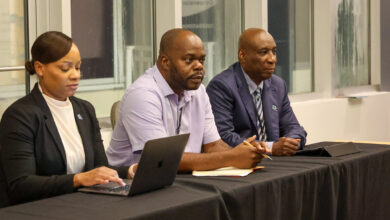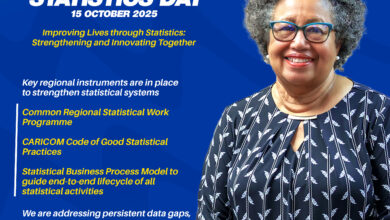CARICOM Secretariat receives publications on Regional Integration
(CARICOM Secretariat, Greater Georgetown, Guyana) The Caribbean Community (CARICOM) Secretariat today received eight new publications on regional integration from Ian Randle Publishers of Jamaica. The publications were received by Assistant Secretary-General for Human and Social Development, Dr. Edward Greene, who accepted on behalf of the CARICOM Secretary-General, H.E. Edwin Carrington.
Mr. Ian Randle, Managing Director of the Publishing house made the presentation during a meeting with Dr. Greene at the Guyana headquarters of the CARICOM Secretariat.
These publications represent one of the outcomes of the collaborative arrangement which exists between the CARICOM Secretariat and the University of the West Indies (UWI) and which made possible, the journey into the realm of publications focusing on regional and international issues that affect the lives of Caribbean people.
The publications presented were Understanding International Trade: A CARICOM Perspective. This publication provides helpful insights on the major trade and related economic issues that currently engage the minds of policy makers and key stakeholders in the Caribbean Community.
The second publication, Observing Elections: The Commonwealth Way: The Early Years, emphasises the programme that commenced in 1990 and continued through to 2000. Though not exhaustive in commenting on all relevant dimensions of ascertaining the will of the people, the study reviews the work of the observers in the early years and identifies some of the lessons that can be learnt from their work during the period.
The third publication, titled The Race for Fisheries and Hydrocarbons in the Caribbean Basin: The Barbados/Trinidad and Tobago Dispute, Regional Delimitations and Implications, seeks to distil the background conditions that gave rise to this dispute and the resulting domestic and international political ramifications
The Fourth publication, The Caribbean Integration Process: A People Centred Approach, is intended to contribute to the debate on regional integration in the ongoing process of education and continuing quest for identification as a Caribbean people.
The fifth publication, titled Intervention, Border and Maritime Issues in CARICOM, offers a variety of perspectives on some key issues for CARICOM. These are the ever present probability of intervention, military and otherwise in the internal affairs of Member States and in the Community at large,
The Sixth publication, titled CARICOM Single Market and Economy: Challenges, Benefits, Prospects, brings together material relevant to an understanding of the CSME beyond the text of the Revised Treaty of Chaguaramas, and seeks to expand on the information available to the regional public, particularly the perceived benefits of the CSME.
Publication number seven, titled Confronting Challenges, Maximising Opportunities: The Diplomacy for Market Access, traces the Region’s response to the many of the challenges as they appears to our respective countries in the years since becoming independent nations. The essential point that it seeks to make, is that the development paradigm which governs both inter state and intra state relations has remained unchanged over the years. The challenges are appearing in forms different from the traditional guises clothed as they now are in new and ever changing sets of conditionalities.
The last publication is titled CARICOM Single Market and Economy: Genesis and Prognosis. It offers essays that represent an attempt to satisfy the needs of laypersons busy with daily survival and progress issues, students, se eking to understand the nature of the evolution towards a CARICOM Single Market and Economy, academics, interested in the comments of their peers and politicians needing to improve the acuity with which they perceive the efforts of and prescribe actions for their individual countries..
These publications respond to the recognised dearth of material on regional integration issues which are available to educational institutions, the public and private sectors about the work being done by Caribbean leaders and the vision which guided them in their efforts to integrate and develop the Caribbean Community.
The Managing Director of Ian Randle expressed a deep sense of satisfaction at the considerable work done by the CARICOM Secretariat and the University of the West Indies in making available this critical mass of material to the public.
Both Dr. Greene and Mr. Randle expressed confidence that the material contained in these publications would not only greatly advance the efforts of the Secretariat in keeping the issues engaging our leaders in the forefront of minds of Caribbean citizens, but would provide a basis for useful dialogue about the problems and prospects of the Caribbean integration process.
On behalf of the Secretariat, Dr Greene in turn congratulated Mr. Randle for the sterling efforts of his publishing enterprise in sustaining the high quality and the varied quantity of material on Caribbean issues in general, and in particular in advancing the understanding of readers on the vital issues of regional integration.





